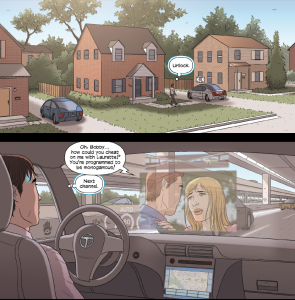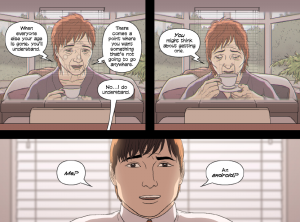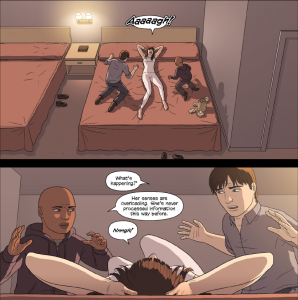I was sure I knew how this was going to go. I’ve seen plenty of anime with this same plot. Usually the guy gets an android because either he’s too shy around girls or because he’s a loser (at least by cultural standards). However, instead of the main male character (and the ones I’ve seen usually have a male as the main character) taking the easy route and ending up with the android, usually she is just a teacher – a live action female simulator for the boy to get over whatever it was that kept him from getting the girl. To help make the boy less cruel, the android is usually destroyed or has to be returned because the trial period is up or some other reason to make the boy get on with his life and not cruelly end things with the android.

So I avoided reading Alex + Ada. The cover with Alex opening up Ada’s box didn’t help things along. But rather than either the love story I was expecting or a sex romp, it turned out to be one of the most prescient comics I’ve read recently. (Right behind The Private Eye by Brian K Vaughan) We’re presented with a world in which a Google Glass-like technology has reached near ubiquity. Alex, the eponymous main character, has one such device embedded (technically making him and most Americans cyborgs) and uses it to think commands at all the computer devices around him. This is also a world in which the leading tech companies were working on achieving AI sentience. When, some time in the past, one of the companies succeeded, the newly self-aware robot massacred everyone at the factory. This leads to a law banning sentience. It is also a world in which non-sentient androids are everywhere – as coaches, sex-bots, and companions for the elderly. Finally, there are self-driving cars controlled via the Google Glass-like tech.
This is not just a world that has existed in countless science fiction stories, movies, and cartoons. This is a world that Google, Microsoft, and others are actively trying to bring into existence. Not only is that true, but Stephen Hawking recently said his biggest fear (and humanity’s bigger fear should be) Artificial Intelligence. The prologue to Alex + Ada (as well as the rest of the plot, which I’ll get to soon), has quite a real chance of playing out in exactly the same way. Our government tends to be reactionary and that often helps science to advance, but what we truly need is a happy medium between free wheeling research and out-right banning. If we do not plan ahead for sentience, it will be created before we can get to grips with what we’ve done. And if things go awry, it will be banned or, in the worst case scenario, a Matrix-like war against our new robot overlords.
Additionally, stories like this one warn us that we may have to grapple with ideas of personhood very soon. This may even take more complex forms if the AIs that achieve sentience do not have a human form. Is it murder to permanently shut off a computer running a sentient AI? Do they become the final civil rights frontier?

Within the context of the world of Alex + Ada we see a pretty full spectrum of attitudes towards androids both before and after there is a suspicion of post-disaster sentience. Some, like Alex’s grandmother see them as the perfect companion to a lonely old person – including for sexual needs. Alex begins the story wary of any robot more complex than his flying Roomba on steroids. Some of his friends loathe anyone having an android. Others are apathetic.
As I move into the latter half of this commentary, I’m going to begin spoiling various plot points. The entire story spans only 3 volumes so, invariably, to get to some of the more dramatic points, I’ll need to spoil various bits of the plot. This shouldn’t be news to long-time readers of Comic POW! and, by the time this posts to the blog and Goodreads, volume three will have been out for several months. Consider yourself warned, dear readers. I will say, however, that while the exact nature of the ending is more spectacular if left unspoiled, this story is full of so many details that I think it can still be enjoyed even if the plot in general has been spoiled.
While we’re introduced to the idea of Alex being unable to get out of a funk ever since his fiancee broke off the engagement, Alex is not thrilled by his grandmother’s idea to send him an android as a companion and (it’s implied) sex-bot. However, even after his first day with her mirrors that of the mother in A.I., he feels guilty at the idea of her being shut off and reset. His anthropomorphism ironically leads to her actual personhood. However, all is not sunshine and rainbows at this point. Alex ends up feeling like the main character of Eddie Murphy’s Coming to America when he meets his bride:
At least Ada has programming to blame for her actions, although one could say the girl in Coming to America was also programmed. It is this dichotomy that leads him to surface her sentience: he anthropomorphizes her enough to not want her erased, but can’t stand the uncanny valley of her servitude.

It is quite significant that within this world, the newly sentient androids will replay their entire life, but with emotions. This raises the stakes on how the owner viewed the robot before sentience. Did he or she treat it as a person or a machine? This is part of what sets Alex + Ada apart from other similar stories. Alex does not treat Ada as a sexbot. He even feels uncomfortable about her simple kissing advances when she first proposes it. It is only after they have both come to terms with what her sentience means that they finally have sex. (There’s also an interesting refrence to slavery when Alex’s grandma “frees” her Android – into sentience – after she dies)
Many sentience stories have at least some part that deals with how sentience interacts with the Internet. It’s the newest wrinkle on the whole automaton passing as human idea that is somewhat older than it seems if you count certain stories in mythology. In the case of Ada, while the Internet is vast and allows Ada to visit anywhere in the world without risk of being caught, she finds the indoors limiting. She has a new, vast intelligence and she wants to experience the real world. Of course, this immediately goes awry as even in Alex’s backyard she’s not safe from nosy neighbors.
In the end, what Jonathan Luna teaches us is that we still have a long way to go before we can do sentience correctly. As our robots move from the disembodied voices of Siri and Cortana to humanoid form, the lines will begin to blur. Things will rarely be easy and obvious either. Even when Alex finally comes to terms with Ada’s sentience, he still has prejudices and ways of thinking that cloud his thoughts and actions. we are rapidly moving in the direction of accidental AI and we have not the slightest clue of how we’ll deal with it when it arrives. Alex + Ada is a great way to get your mind thinking about these issues and it’s also a great narrative full of meaning and metaphor.
I love discussion, please hit me up in the comments.
Alex + Ada written by Jonathan Luna and Sarah Vaughn with art by Jonathan Luna.
